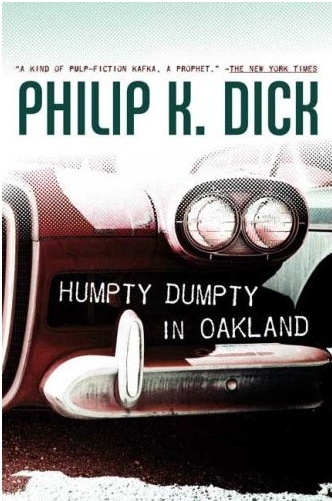Best known for his psychedelic, mind-bending sci-fi, Philip K Dick wrote all kinds of stories early in his career. Humpty Dumpty In Oakland is a rare realistic novel of his written in 1960; rejected by his publisher and finally published after his death in 1986 by UK publisher Gollancz, it became available in the US this past fall.
Set in San Francisco during the late 1950's, Humpty gives us the story of used car salesman Al Miller and his elderly landlord, Jim Fergusson. Miller's view on life quickly descends when Fergusson decides to sell his land and open up a car repair shop in the developing suburbs just outside the city, leaving Miller to fend for himself and search for a new way of life. Miller also fears Fergusson will be ripped off by the shady businessmen putting the deal together, so Miller tries to uncover the truth to protect his friend. Instead Miller bumbles into and backs out of a job in the recording industry, causes Fergusson to have a heart attack and makes the final move that ends his marriage with his overbearing wife. Despite the grim plot PKD works in some odd touches of dark humor, particularly when writing about the pop culture of the day.
This is far from a perfect novel, and not anywhere near PKD's best or most interesting. With a story that flip-flops between Miller and Fegusson, it's hard to tell whose story PKD is trying to tell here. Honestly, anyone new to PKD reading this probably won't get the cult following around his books. But people familiar with his Sci-fi will see a lot of familiar ideas. Like with many of his novels, Humpty looks at a society on the cusp of change and tries to show how this change will shape the lives of ordinary, everyday folks. Instead of contact with an alien race or the rise of androids who want to live their own lives, Humpty looks at the more down-to-earth issues of Suburbanization and the growth of Corporate culture. There's probably a paper in this somewhere, looking at PKD's major themes and doing a compare/contrast in how he deals with them in his realistic work vs. his imaginative work. But I'll save that for an industrious English major to tackle.
Excelsior.

1 comment:
Great post.You can see mine, http://biology-today.com/
Post a Comment